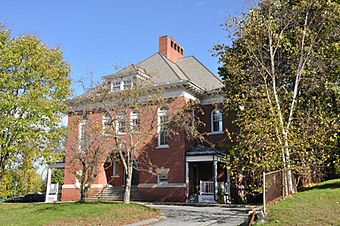Baldwinville Village Historic District facts for kids
Quick facts for kids |
|
|
Baldwinville Village Historic District
|
|

The elementary school building
|
|
| Location | Maple and Central Sts., Templeton, Massachusetts |
|---|---|
| Area | 21 acres (8.5 ha) |
| Built | 1754 |
| Architect | James E. Fuller |
| Architectural style | Greek Revival, Queen Anne |
| NRHP reference No. | 86000273 |
| Added to NRHP | February 27, 1986 |
The Baldwinville Village Historic District is a special area in the village of Baldwinville, located in northern Templeton, Massachusetts. It's like a time capsule, showing how the village looked in the 1800s. Even though many old factories are gone, you can still see historic homes and public buildings. This district was added to the National Register of Historic Places in 1986.
Contents
Exploring Baldwinville's Past
How Baldwinville Grew Up
The town of Templeton was first settled in the 1750s. It officially became a town in 1761. The northern part of Templeton, where Baldwinville is now, was not very populated at first.
In 1763, a bridge was built over the Otter River. This was near an early saw and grist mill. These mills helped the area start to grow.
The oldest building still standing is the home of Eden Baldwin, built in 1797. He owned local lumber and brick businesses. His house is at the corner of Maple Street and Baldwinville Road.
In 1805, a new road, called a turnpike, opened. It connected Royalston to the bridge. This helped the area develop into a small village. By 1830, it was officially named Baldwinville.
Buildings from the Past
Even though the old mill buildings are gone, you can still see homes from this early period. Many of these houses are built in the Greek Revival style. This style was popular in the early 1800s.
More growth happened when railroads arrived in 1847 and 1872. Baldwinville became the main economic center of Templeton. The village was famous for making chairs.
During its busiest time in the late 1800s, many beautiful houses were built. These homes often featured the Queen Anne and Stick architectural styles.
Challenges and Changes
The industries in Baldwinville faced many challenges. Floods and fires often damaged buildings. A huge storm, the Great New England Hurricane of 1938, caused a lot of destruction. It destroyed or badly damaged most of the remaining factory buildings.
Where is the Historic District?
The historic district is shaped like a long line. It runs along Elm Street north of the river. It also follows Baldwinville Road south of the river.
The northern edge of the district is near Mason Street. The southern edge is close to Mountain View Street. On the north side of the river, the district gets wider. This is where the village's main shops and businesses were located. It stretches west along Pleasant and Memorial Streets. It also extends east along Circle and Central Streets.



